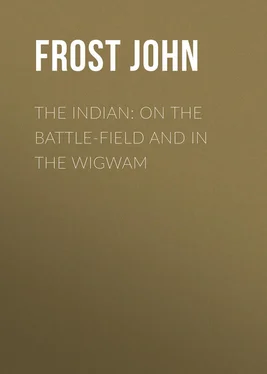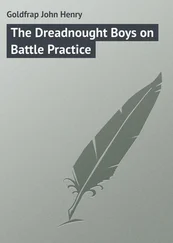John Frost - The Indian - On the Battle-Field and in the Wigwam
Здесь есть возможность читать онлайн «John Frost - The Indian - On the Battle-Field and in the Wigwam» — ознакомительный отрывок электронной книги совершенно бесплатно, а после прочтения отрывка купить полную версию. В некоторых случаях можно слушать аудио, скачать через торрент в формате fb2 и присутствует краткое содержание. Жанр: foreign_antique, foreign_prose, на английском языке. Описание произведения, (предисловие) а так же отзывы посетителей доступны на портале библиотеки ЛибКат.
- Название:The Indian: On the Battle-Field and in the Wigwam
- Автор:
- Жанр:
- Год:неизвестен
- ISBN:нет данных
- Рейтинг книги:5 / 5. Голосов: 1
-
Избранное:Добавить в избранное
- Отзывы:
-
Ваша оценка:
- 100
- 1
- 2
- 3
- 4
- 5
The Indian: On the Battle-Field and in the Wigwam: краткое содержание, описание и аннотация
Предлагаем к чтению аннотацию, описание, краткое содержание или предисловие (зависит от того, что написал сам автор книги «The Indian: On the Battle-Field and in the Wigwam»). Если вы не нашли необходимую информацию о книге — напишите в комментариях, мы постараемся отыскать её.
The Indian: On the Battle-Field and in the Wigwam — читать онлайн ознакомительный отрывок
Ниже представлен текст книги, разбитый по страницам. Система сохранения места последней прочитанной страницы, позволяет с удобством читать онлайн бесплатно книгу «The Indian: On the Battle-Field and in the Wigwam», без необходимости каждый раз заново искать на чём Вы остановились. Поставьте закладку, и сможете в любой момент перейти на страницу, на которой закончили чтение.
Интервал:
Закладка:
Those whom I had painted, though evidently somewhat alarmed, were unwilling to acknowledge it, and those whom I had not painted, unwilling to be outdone in courage, allowed me the privilege; braving and defying the danger that they were evidently more or less in dread of. Feuds began to arise too, among some of the chiefs of the different bands, who, (not unlike some instances among the chiefs and warriors of our own country,) had looked upon their rival chiefs with unsleeping jealousy, until it had grown into disrespect and enmity. An instance of this kind presented itself at this critical juncture, in this assembly of inflammable spirits, which changed in a moment, its features, from the free and jocular garrulity of an Indian levee, to the frightful yells and agitated treads and starts of an Indian battle. I had in progress at this time, a portrait of Mah-to-tchee-ga, (little bear;) of the Onc-pa-pa band, a noble fine fellow, who was sitting before me as I was painting. I was painting almost a profile view of his face, throwing a part of it into shadow, and had it nearly finished, when an Indian by the name of Shon-ka, (the dog,) chief of the Caz-a-zshee-ta band, an ill-natured and surly man – despised by the chiefs of every other band, entered the wigwam in a sullen mood, and seated himself on the floor in front of my sitter, where he could have a full view of the picture in its operation. After sitting a while with his arms folded, and his lips stiffly arched with contempt, he sneeringly spoke thus:
“Mah-to-tchee-ga is but half a man.”
Dead silence ensued for a moment, and nought was in motion save the eyes of the chiefs, who were seated around the room, and darting their glances about upon each other in listless anxiety to hear the sequel that was to follow! During this interval, the eyes of Mah-to-tchee-ga had not moved – his lips became slightly curved, and he pleasantly asked in low and steady accent, “Who says that?”
“Shon-ka says it,” was the reply, “and Shonka can prove it.” At this the eyes of Mah-to-tchee-ga, which had not yet moved, began steadily to turn, and slow, as if upon pivots, and when they were rolled out of their sockets till they had fixed upon the object of their contempt; his dark and jutting brows were shoving down in trembling contention, with the blazing rays that were actually burning with contempt, the object that was before them. “Why does Shon-ka say it?”
“Ask We-chash-a-wa-kon, (the painter,) he can tell you; he knows you are but half a man – he has painted but one half of your face, and knows the other half is good for nothing!”
“Let the painter say it, and I will believe it; but when the Dog says it let him prove it.”
“Shon-ka has said it, and Shon-ka can prove it; if Mah-to-tchee-ga be a man, and wants to be honored by the white men, let him not be ashamed; but let him do as Shon-ka has done, give the white man a horse, and then let him see the whole of your face without being ashamed.”
“When Mah-to-tchee-ga kills a white man and steals his horses, he may be ashamed to look at a white man until he brings him a horse! When Mah-to-tchee-ga waylays and murders an honorable and brave Sioux, because he is a coward and not brave enough to meet him in fair combat, then he may be ashamed to look at a white man till he has given him a horse! Mah-to-tchee-ga can look at any one; and he is now looking at an old woman and a coward!”
This repartee, which had lasted for a few minutes, to the amusement and excitement of the chiefs, being thus ended: The Dog suddenly rose from the ground, and wrapping himself in his robe, left the wigwam, considerably agitated, having the laugh of all the chiefs upon him.
The Little Bear had followed him with his piercing eyes until he left the door, and then pleasantly and unmoved, resumed his position, where he sat a few minutes longer, until the portrait was completed. He then rose, and in a most graceful and gentlemanly manner, presented to me a very beautiful shirt of buckskin, richly garnished with quills of porcupine, wringed with scalp-locks (honorable memorials) from his enemies’ heads, and painted, with all his battles emblazoned on it. He then left my wigwam, and a few steps brought him to the door of his own, where the Dog intercepted him, and asked, “What meant Mah-to-tchee-ga, by the last words that he spoke to Shon-ka?”
“Mah-to-tchee-ga said it, and Shon-ka is not a fool – that is enough.” At this the Dog walked violently to his own lodge; and the Little Bear retreated into his, both knowing from looks and gestures what was about to be the consequence of their altercation.
The Little Bear instantly charged his gun, and then, as their custom is, threw himself upon his face, in humble supplication to the Great Spirit for his aid and protection. His wife, in the meantime, seeing him agitated, and fearing some evil consequences, without knowing any thing of the preliminaries, secretly withdrew the bullet from the gun, and told him not of it.
The Dog’s voice, at this moment, was heard, and recognized at the door of Mah-to-Shee-ga’s lodge, “If Mah-to-tchee-ga be a whole man, let him come out and prove it; it is Shon-ka that calls him!”
His wife screamed; but it was too late. The gun was in his hand, and he sprang out of the door – both drew and simultaneously fired. The Dog fled uninjured; but the Little Bear lay weltering in his blood (strange to say!) with all that side of his face shot away, which had been left out of the picture; and, according to the prediction of the Dog, “good for nothing;” carrying away one half of the jaws, and the flesh from the nostrils and corner of the mouth, to the ear, including one eye, and leaving the jugular vein entirely exposed. Here was a “coup;” and any one accustomed to the thrilling excitement that such things produce in an Indian village, can form some idea of the frightful agitation amidst several thousand Indians, who were divided into jealous bands or clans, under ambitious and rival chiefs! In one minute a thousand guns and bows were seized! A thousand thrilling yells were raised; and many were the fierce and darting warriors who sallied round the Dog for his protection – he fled amidst a shower of bullets and arrows; but his braves were about him! The blood of the Onc-pa-pas was roused, and the indignant braves of that gallant band rushed forth from all quarters, and, swift upon their heels, were hot for vengeance! On the plain, and in full view of us, for some time, the whizzing arrows flew, and so did bullets, until the Dog and his brave followers were lost in distance on the prairie! In this rencontre, the Dog had his arm broken; but succeeded, at length, in making his escape.
On the next day after this affair took place, Little Bear died of his wound, and was buried amidst the most pitiful and heart-rending cries of his distracted wife, whose grief was inconsolable at the thought of having been herself the immediate and innocent cause of his death, by depriving him of his supposed protection.
This marvellous and fatal transaction was soon talked through the village, and the eyes of all this superstitious multitude were fixed on me as the cause of the calamity – my paintings and brushes were instantly packed, and all hands, Traders and Travellers, assumed at once a posture of defence.
I evaded, no doubt, in a great measure, the concentration of their immediate censure upon me, by expressions of great condolence, and by distributing liberal presents to the wife and relations of the deceased; and by uniting also with Mr. Laidlaw and the other gentlemen, in giving him honorable burial, where we placed over his grave a handsome Sioux lodge, and hung a white flag to wave over it.
On this occasion many were the tears that were shed for the brave and honorable Mah-to-tchee-ga, and all the warriors of his band swore sleepless vengeance on the Dog, until his life should answer for the loss of their chief.
Читать дальшеИнтервал:
Закладка:
Похожие книги на «The Indian: On the Battle-Field and in the Wigwam»
Представляем Вашему вниманию похожие книги на «The Indian: On the Battle-Field and in the Wigwam» списком для выбора. Мы отобрали схожую по названию и смыслу литературу в надежде предоставить читателям больше вариантов отыскать новые, интересные, ещё непрочитанные произведения.
Обсуждение, отзывы о книге «The Indian: On the Battle-Field and in the Wigwam» и просто собственные мнения читателей. Оставьте ваши комментарии, напишите, что Вы думаете о произведении, его смысле или главных героях. Укажите что конкретно понравилось, а что нет, и почему Вы так считаете.









![John Bruce - The Lettsomian Lectures on Diseases and Disorders of the Heart and Arteries in Middle and Advanced Life [1900-1901]](/books/749387/john-bruce-the-lettsomian-lectures-on-diseases-and-disorders-of-the-heart-and-arteries-in-middle-and-advanced-life-1900-1901-thumb.webp)


